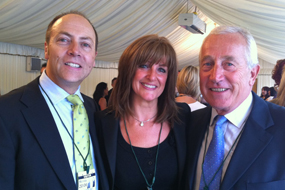CientŽ goes to Parliament in fight for tougher legislation


Trisha with Good Salon Guide's Dawson Penn
Berkhamsted’s Trisha Buller of Cienté took the fight for higher standards in hairdressing to MPs in the House of Commons this week.
People outside the hairdressing industry may not know about the Hairdressing Council, set up in 1964 by an Act of Parliament. Perhaps they’d be more aware of it, if they knew more about the disfiguring damage that can be caused by the powerful chemicals and everyday tools of hairdressing in the hands of people who are not qualified to use them.

Trisha with Andrew Barton
The aim of the 1964 Hairdresser (Registration) Act was to set new standards of professionalism by creating a state register of hairdressers, similar to those for doctors, dentists and nurses. Unfortunately, registration was not made compulsory and Britain is now one of the few countries in Europe with an unregulated hairdressing industry.
As you’d imagine, over the years only hairdressers who were passionate about their industry and already committed to high standards became state registered. The unqualified, inexperienced people who were the target of the legislation continued to put the public at risk.
For a long time now, top hairdressers like Vidal Sassoon, Trevor Sorbie MBE and Cienté's Trisha Buller have campaigned to raise standards in the industry and for state registration to be made compulsory. And this week they took their campaign to the House of Commons, at a lunch organised by the only MP who knows what he’s talking about when it comes to hair.
David Morris was proud to be a hairdresser for 26 years and owned his own salon until he turned to politics. He is right behind the campaign by Trisha and other members of the Hairdressing Council to persuade Parliament to strengthen the Hairdressing Act. Now he is trying to get the law strengthened, with the help of this key group of influential supporters.
He stated...
The 1964 Hairdresser (Registration) Act should be made compulsory.
I believe that allowing unqualified people to use hazardous chemicals represents a danger to the public and should be stopped.





